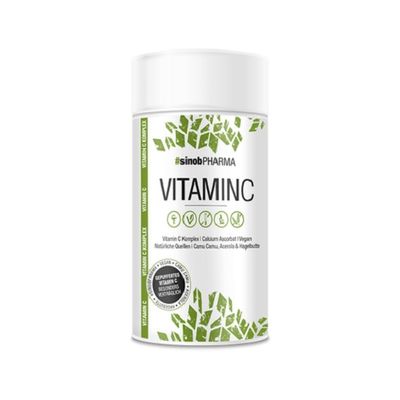Blackline 2.0 Vitamin C - 60 Kapseln
Blackline 2.0 Vitamin C - 60 Kapseln
Probably the best vitamin C capsules on the market
These capsules have it all. In addition to calcium ascorbate, the particularly well-tolerated and buffered vitamin C, we also rely on camu camu, rosehip extract and acerola powder, i.e. the best natural sources of vitamin C that nature has to offer.
Why do you need vitamin C anyway?
Since the human body cannot produce vitamin C itself, you have to get it from food. Vitamin C is an antioxidant. ... Vitamin C is also required for the production of collagen (= protein in the connective tissue). Also for the formation of cartilage and bone tissue.
How much vitamin C "must" be taken?
Normal people who do not exercise and are healthy do not actually need to take vitamin C at all. Since you are on our website, you are probably an athlete or someone who is very familiar with the subject. Therefore, a few different rules apply to you:
The recommended daily dose of vitamin C is between 100-200mg. Such small doses are easy to cover with a balanced and healthy diet. However, the situation is different for athletes or when shortening the duration of a cold. Here we are talking about up to 2,000mg (2g) a day. It is not possible to cover such a quantity through diet. Here is a small table:
| Vitamin C content per 100g | |
| camu camu | 2000mg |
| Acerola Cherry | 1300-1700mg |
| Hagebutte | 1250mg |
| Sandorn | 200-800mg |
| Apple | 12mg |
| lemon | 50mg |
| Paprika red | 140mg |
| Kiwi depending on the degree of ripeness | 200-300mg |
| Orange | 50mg |
| Brussels sprouts | 110mg |
To get 100-200mg of vitamin C you would need to eat the following:
- about 4-7 apples
- that. 1-2 Paprika
- 1/2 - 1 Kiwi
- 2-4 lemons
Or just a colorful mix of everything. In short, it is quite doable as long as you eat consciously and have a balanced diet.
Now we come to the athletes or when it comes to shortening a cold. Here we are talking about 2000mg a day:
- about 150 apples
- 1.4kg Peppers
- 4kg lemon
- let\'s leave it ;)
As you can see, in higher doses it is no longer possible to cover your vitamin C needs with food alone. This is exactly where dietary supplements come into play. And ONLY then!! Because you should ALWAYS try to meet your nutritional needs by eating right.
The perfect vitamin C blend
In our vitamin C capsules from the #sinob Pharmaline we rely on the 4 best sources of vitamin C.
- Calcium-Ascorbat
- Camu-Camu
- Acerola Cherry
- Hagebutte
As you can see from the table above, these natural vitamin C sources have been mixed by nature with the highest natural proportion of vitamin C. To be honest, that\'s not why we chose these sources. Rather, it is the phytochemicals found in natural sources.
In fact, your body doesn\'t care if the ascorbic acid (vitamin C) comes from a lemon, paprika, or rosehip powder, or from a synthetic source. Your body doesn\'t even know the difference. The decisive factors are the secondary plant substances that every natural source of vitamin C brings with it. Because these act synergistically and thus improve the absorption of vitamin C in your body. This fact is exactly why we have added natural vitamin C sources to our vitamin C capsule product.
Vitamin C buffered and easy on the stomach in the form of calcium ascorbate
Calcium-Ascorbat
Since our #sinob PHARMA Line only uses the very best raw materials, using simple ascorbic acid was out of the question for us. The cheap and very acidic ascorbic acid is usually used in vitamin C products. If you only need a little vitamin C, simple ascorbic acid also causes few problems (otherwise it can lead to diarrhea, heartburn, stomach pain). However, if you need a little more vitamin C and or have a nervous gastrointestinal tract, simple ascorbic acid is out of the question for many people.
It is precisely for these people that we have resorted to calcium ascorbate. Here, the vitamin C is virtually bound to calcium and is only converted into the active form in the stomach. Calcium ascorbate is acid-free and therefore optimally tolerated. Even at higher doses, this form of vitamin C has no effect on the pH of your stomach acid.
Camu-Camu
Have you ever heard of camu camu? Not yet? No problem! Even the natives of the Amazon region, where the shrub grows, spurned the fruit because it was far too acidic for them. Researchers have recently discovered that camu camu has the highest natural vitamin C content.
Acerola Cherry
Somewhat better known as camu-camu, and also from South America, comes the vitamin C-rich acerola cherry. It ranks second among the foods with the highest vitamin C content. Even if the name sounds similar, the fruit has nothing to do with our local cherries. Since the cherries are extremely sensitive, you will rarely see them here in Germany. Most of the time you see powder, jam or drinks with the acerola cherry.
Hagebutten
Last but not least, the dog rose and its fruits. 3rd place in the global ranking of the highest natural vitamin C content, the rosehip. Unfortunately, when boiling, a lot of vitamin C is lost, so that rosehip jam no longer has 1250mg of vitamin C, but only a measly 50mg. Therefore, the extract we use is the much better choice.
Share


